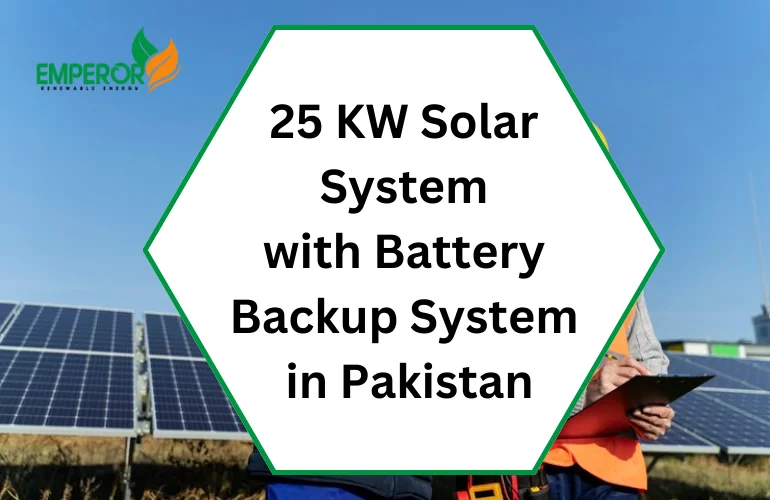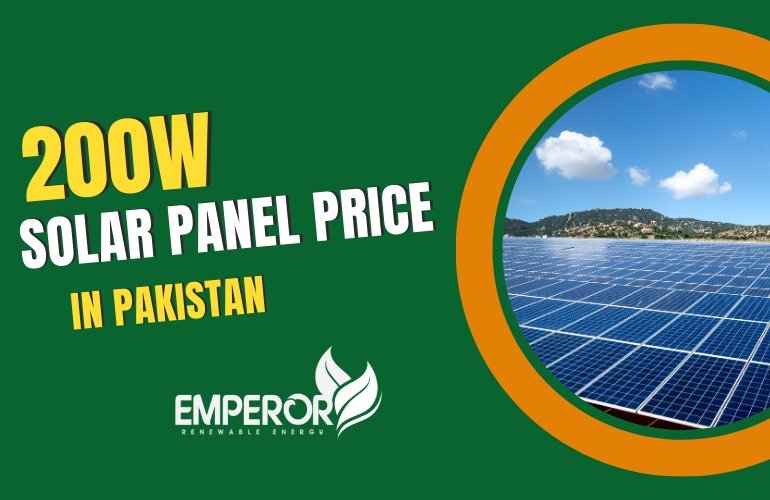In today’s world, solar energy has become one of the most effective and affordable renewable energy sources. With increasing electricity bills and frequent load shedding in Pakistan, many homeowners and businesses are turning towards solar power solutions. A 25 kW solar system with a battery backup system is an excellent solution for ensuring an uninterrupted power supply. In this blog post, we’ll dive deep into the benefits, costs, and everything you need to know about installing a 25 kW solar system in Pakistan.
Why Choose a 25 kW Solar System in Pakistan?
1. Perfect for Medium to Large Households or Small Businesses
A 25 kW solar system is ideal for large households or small businesses with high electricity demands. It can simultaneously power multiple air conditioners, refrigerators, lights, and other appliances. This system ensures that energy is generated during the day and stored for use during the night or in case of a power outage.
2. Sustainable and Environmentally Friendly
Switching to solar energy is not only cost-effective but also helps reduce carbon footprints. By installing a 25 kW solar system, you’re contributing to a greener Pakistan by reducing the dependence on fossil fuels.
3. Protection Against Load Shedding
Load shedding is a persistent issue in many parts of Pakistan. A 25 kW solar system with a battery backup ensures a continuous power supply, even during extended power outages.
Components of a 25 kW Solar System
A 25 kW solar system is composed of several key components that work together to generate and store electricity:
1. Solar Panels
Solar panels are the primary component of any solar power system. For a 25 kW system, you’ll need about 75 to 80 high-efficiency solar panels, depending on the type and wattage of each panel.
2. Inverters
Inverters are essential for converting the direct current (DC) generated by the solar panels into alternating current (AC), which is usable by home appliances. Depending on the setup, a 25 kW system usually requires a powerful inverter or multiple smaller ones.
3. Batteries
A battery backup system stores the excess energy generated by the solar panels during the day. This stored energy can be used at night or during power outages. The battery system ensures an uninterrupted power supply in Pakistan’s challenging energy environment.
4. Mounting Structure
The mounting structure holds the solar panels in place, ensuring they receive maximum sunlight throughout the day. This structure must be sturdy and weather-resistant to withstand harsh conditions like strong winds or heavy rains.
5. Wiring and Electrical Components
Proper wiring and electrical components ensure that the entire system functions efficiently. Professional installation ensures that all the components work together without any safety hazards.
Benefits of Installing a 25 kW Solar System in Pakistan
1. Cost Savings on Electricity Bills
One of the most significant advantages of installing a 25 kW solar system is the substantially reduced electricity bills. Depending on the amount of sunlight and energy consumption, this system can cover a considerable portion, if not all, of your energy needs.
2. Energy Independence
Relying solely on grid electricity leaves you vulnerable to price hikes and load shedding. With a solar system and battery backup, you’re less dependent on the national grid and enjoy uninterrupted power.
3. Return on Investment (ROI)
Although the upfront cost of a 25 kW solar system may seem high, the long-term savings on electricity bills and the protection against load shedding make it a worthwhile investment. Homeowners and businesses often expect to break even on their investments within 5 to 7 years.
4. Government Incentives
In Pakistan, the government offers various incentives and tax breaks for those who install solar power systems. There are net metering programs that allow you to sell excess electricity back to the grid, further reducing your costs.
Cost of a 25 kW Solar System in Pakistan
The cost of a 25 kW solar system in Pakistan can vary based on several factors, including the quality of the components, the installer’s charges, and any additional features you choose. Here’s a rough breakdown of the costs:
- Solar Panels: High-efficiency solar panels generally cost around PKR 20,000 to 30,000 per panel. For a 25 kW system, the total cost of panels could range from PKR 1,500,000 to 2,400,000.
- Inverter: A high-quality inverter for a 25 kW system typically costs around PKR 500,000 to 800,000.
- Batteries: Battery costs can vary depending on the type (lead-acid or lithium-ion). A battery system for a 25 kW setup can cost anywhere from PKR 1,000,000 to 1,800,000.
- Installation: Professional installation can range from PKR 200,000 to 400,000, depending on the complexity of the installation.
Total Estimated Cost: Depending on the quality and specifications, the overall cost for a 25 kW solar system with a battery backup can range from PKR 3.5 million to 5.5 million.
Battery Backup: Is It Worth the Investment?
A battery backup system increases the cost of a solar installation but is essential for ensuring continuous power supply during load shedding or cloudy days. Let’s look at why it’s worth the investment:
1. Uninterrupted Power Supply
The primary benefit of a battery backup system is the assurance of power when the grid fails. In Pakistan, where load shedding is expected, this can be a lifesaver for businesses and homes.
2. Energy Storage for Night Use
Without a battery backup, the excess energy generated during the day goes to waste. A battery can store that energy at night or during peak hours when electricity rates are higher.
3. Long-Term Savings
Although batteries add to the initial cost, they pay off in the long run by reducing your dependency on the grid and providing stored energy during outages.
How to Maintain Your 25 kW Solar System
Proper maintenance is key to ensuring the efficiency and longevity of your solar system. Here are a few maintenance tips:
1. Clean Your Solar Panels Regularly
Dust, dirt, and debris can accumulate on your solar panels and reduce efficiency. To ensure maximum energy production, it’s essential to clean them at least once a month.
2. Inspect Wiring and Components
Check the wiring and other components regularly for wear and tear. If you notice any issues, contact a professional immediately to address the problem.
3. Monitor Battery Health
Batteries degrade over time, so it’s essential to monitor their performance. Lithium-ion batteries generally last longer than lead-acid batteries, but both require periodic checks.
4. Track Energy Production
Most modern inverters come with monitoring systems that allow you to track your solar system’s performance. Keeping an eye on energy production can help you spot issues early and ensure everything is running efficiently.
Net Metering and Government Policies in Pakistan
Net metering is a system that allows you to sell excess electricity generated by your solar system back to the grid. This can further reduce your electricity costs and provide an additional income stream. The government of Pakistan has introduced policies that encourage the adoption of solar energy by providing tax breaks and facilitating net metering.
Register with your local electricity provider, such as WAPDA or K-Electric, to take advantage of net metering and get the necessary approvals.
Conclusion: Why a 25 kW Solar System with Battery Backup is a Smart Choice
A 25 kW solar system with a battery backup is a smart investment for anyone looking to save on electricity bills, gain energy independence, and contribute to a greener Pakistan. With the rising cost of electricity and the frequent load shedding, switching to solar power ensures a reliable and sustainable energy solution.
While the initial investment may seem high, the long-term benefits of cost savings, uninterrupted power, and the possibility of returning excess energy to the grid make it worthwhile. With government incentives and the potential for net metering, now is the best time to consider installing a 25 kW solar system in Pakistan.




